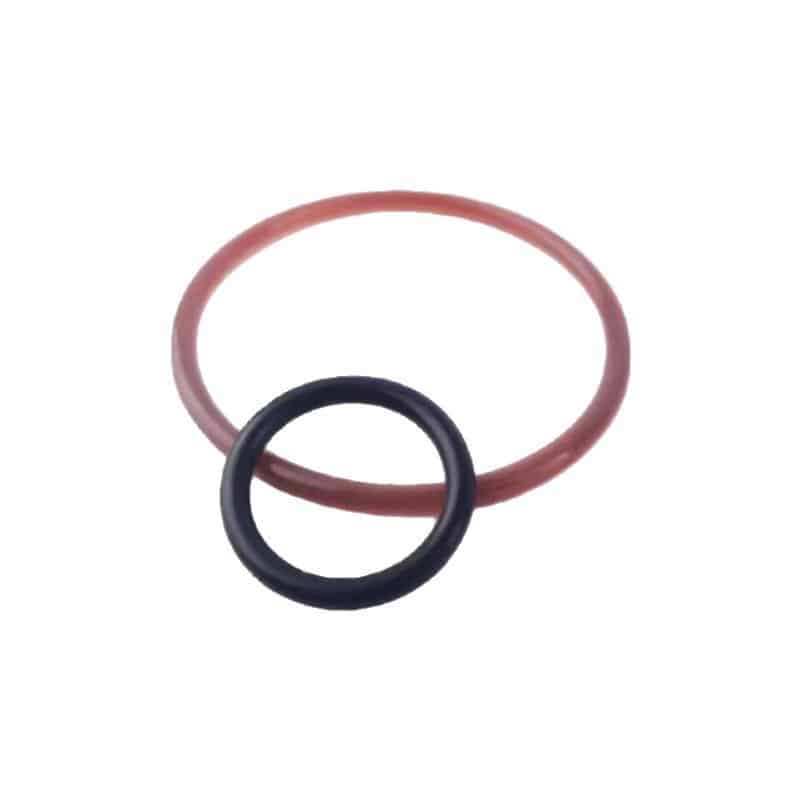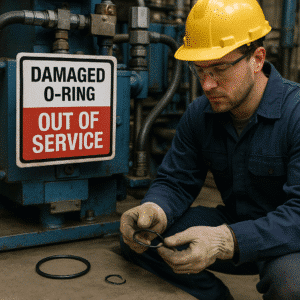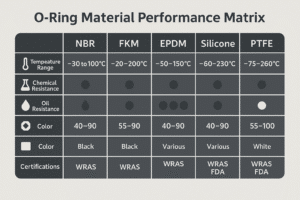Hydraulic leaks in excavators are a costly problem. I’ve seen firsthand how the right seals prevent downtime and extend machine lifespan.
Excavator hydraulic seals are essential for maintaining system pressure, preventing leaks, and protecting cylinders from wear and contaminants.

Let’s break down how to choose the right seals for your excavator.
Why Are Hydraulic Seals Critical for Excavator Performance?
Hydraulic seals:
- Prevent fluid leaks, maintaining pressure
- Block dust, debris, and water ingress
- Reduce wear & friction in cylinder components
- Ensure smooth, reliable machine operation
For sealing basics, read our Guía de principios de funcionamiento de las juntas tóricas.
Which Hydraulic Seals Are Used in Excavators?
| Tipo de sello | Función | Mejor para |
|---|---|---|
| Sellos de pistón | Stop fluid bypassing piston | High-pressure lifting/digging |
| Sellos de varilla | Prevent rod-end leakage | High-temp & aggressive fluids |
| Sellos de limpiaparabrisas | Clean rod surfaces | Muddy, dusty job sites |
| Anillos de desgaste | Prevent metal contact | High-load lateral support |
| O-Rings & Backup Rings | Static sealing support | Cylinder internals |
Explorar Seal Kits for Cylinders Para aplicaciones de excavadoras.
What Materials Are Best for Excavator Hydraulic Seals?
| Material | Rango de temperatura | Mejor uso | Ventajas |
|---|---|---|---|
| TPU | -40°C a 100°C | Sellos de varilla y limpiaparabrisas | Flexible, wear-resistant |
| NBR | -30°C a 110°C | General seals | Cost-effective, oil resistant |
| FKM | -20°C a 200°C | High-temp sealing | Resistencia al calor y a los productos químicos |
| Teflón | -200°C a 260°C | Rod & piston seals | Extreme durability, chemical proof |
| POM | -40°C a 120°C | Anillos de desgaste | Alta resistencia, baja fricción. |
✅ Consejo: For excavators, TPU & PTFE offer the best balance of wear resistance and chemical durability.
¿Cómo medir los sellos hidráulicos para excavadoras?
Correct sizing is key to leak prevention:
- Measure Inner Diameter (ID)
- Measure Outer Diameter (OD)
- Measure Cross-Section (CS)
| Tipo de sello | IDENTIFICACIÓN | sobredosis | CS |
|---|---|---|---|
| Sello de varilla | 50 milímetros | 60 milímetros | 5 milímetros |
| Sello de pistón | 75 milímetros | 85 milímetros | 7 milímetros |
| Sello del limpiaparabrisas | 90 milímetros | 100 milímetros | 6 milímetros |
¿Necesitas tamaños personalizados? Prueba nuestro Herramienta para hacer juntas tóricas.
Common Hydraulic Seal Failures & How to Prevent Them
| Causa de la falla | Prevención |
|---|---|
| Calor excesivo | Use FKM/PTFE for high-temp zones |
| Contaminants | Maintain wiper seals, replace as needed |
| Poor Installation | Always use seal installation tools |
| Fluid Incompatibility | Select chemical-resistant materials |
| Wear & Aging | Regular inspections, scheduled replacements |
Nuestro Seal Failure Guide covers prevention in detail.
Why Upgrading Excavator Seals Saves You Money
- 70% of hydraulic failures are seal-related
- Poor seals lead to oil leaks, loss of power, and costly downtime
- Upgrading to high-performance TPU & PTFE seals reduces maintenance and increases machine lifespan
For heavy-duty sealing, check Hydraulic Seal Solutions.
Where to Get Reliable Excavator Hydraulic Seals?
Hengoseal offers:
- OEM-compliant excavator seals
- High-performance TPU, FKM, PTFE materials
- Fast delivery, no MOQ
Explore top products:
📩 Correo electrónico: [email protected]
WhatsApp: +86 17622979498
Conclusión
Choosing the right hydraulic seals is essential for excavator performance and longevity. Invest in high-quality TPU and PTFE seals to reduce downtime and maintenance costs.
Get Excavator Seals That Last – Contact Hengoseal Today
📩 Correo electrónico: [email protected]
WhatsApp: +86 17622979498
Related topic
How to Choose Hydraulic Seal Kits by Size
Common Hydraulic Seal Failures & Prevention
How to Reduce Downtime with Better Seal Selection


